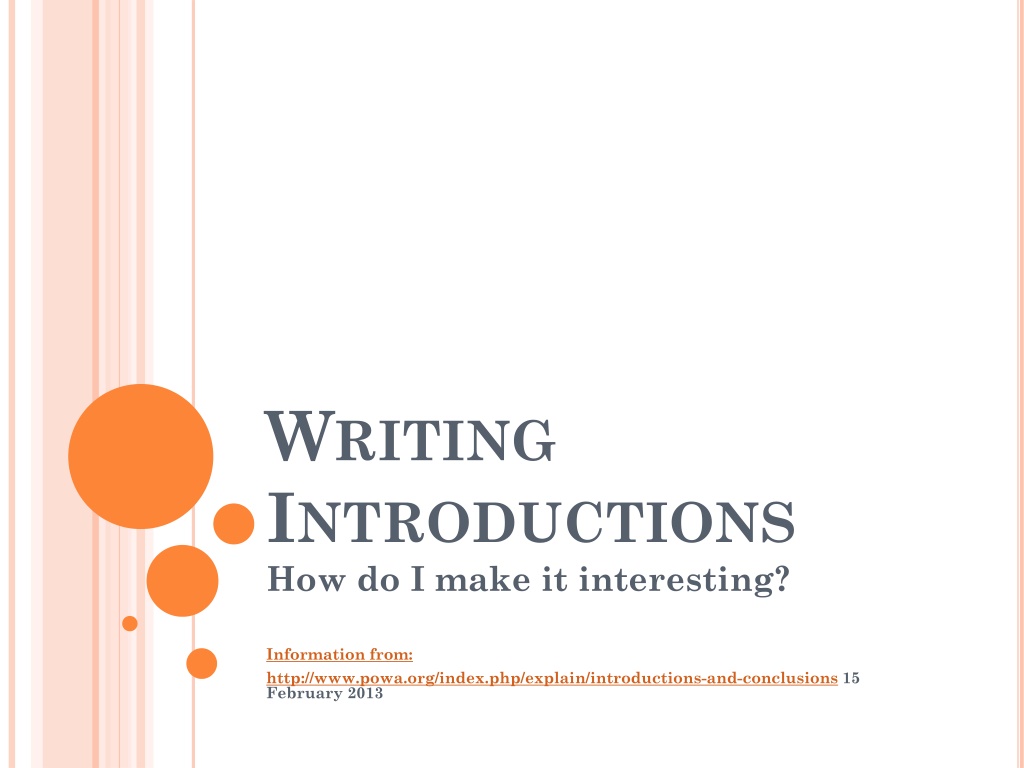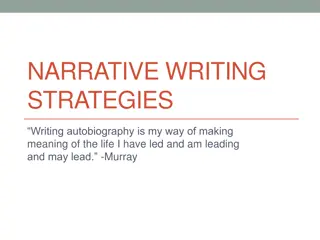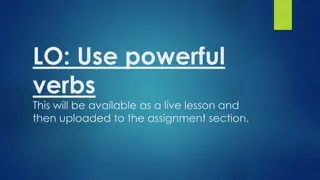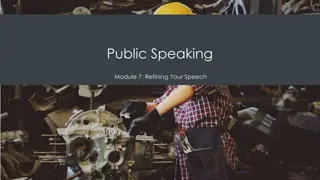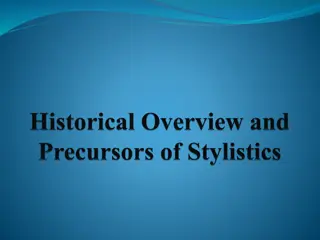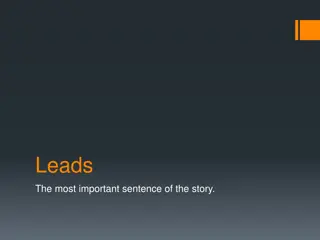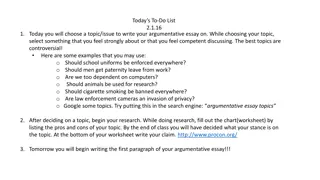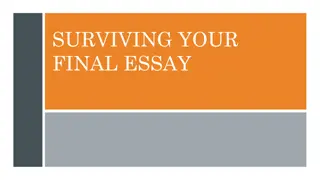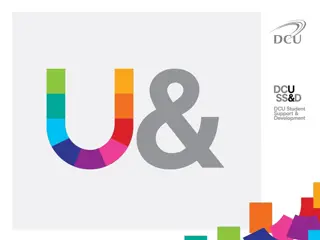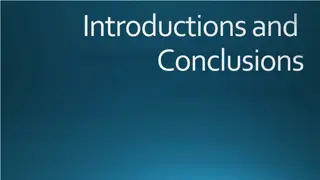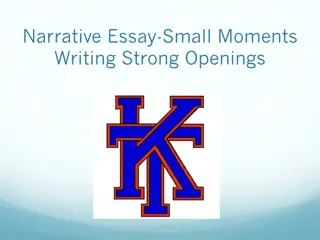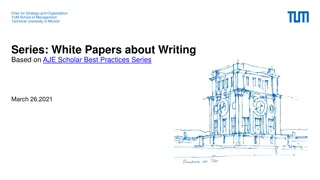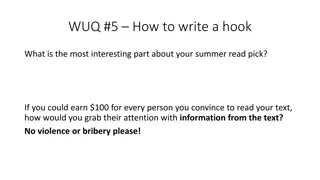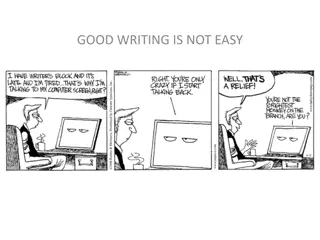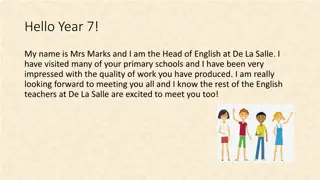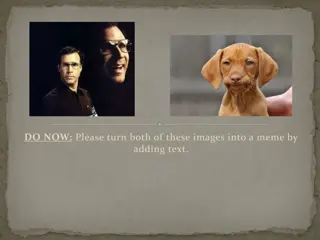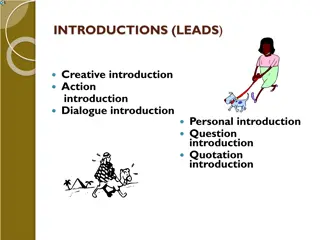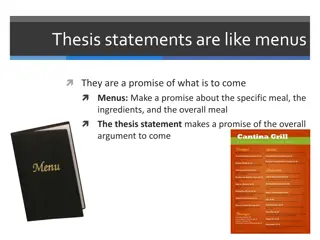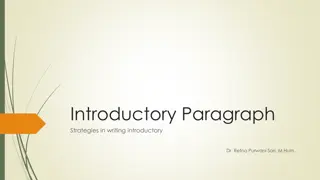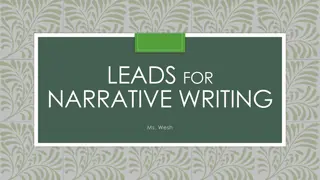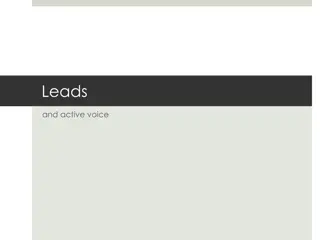Crafting Engaging Introductions to Captivate Your Readers
Begin your writing with a captivating introduction, akin to a first impression when meeting someone new. Focus on grasping the reader's attention, leading with a fact or example, or dispelling a common misconception. Make your introduction purposeful and concise, setting the tone for a strong and lasting connection with your audience.
Download Presentation

Please find below an Image/Link to download the presentation.
The content on the website is provided AS IS for your information and personal use only. It may not be sold, licensed, or shared on other websites without obtaining consent from the author. Download presentation by click this link. If you encounter any issues during the download, it is possible that the publisher has removed the file from their server.
E N D
Presentation Transcript
WRITING INTRODUCTIONS How do I make it interesting? Information from: http://www.powa.org/index.php/explain/introductions-and-conclusions 15 February 2013
HOW DO I BEGIN?? The beginning and end of your speech are positions of high emphasis. Why? Keep them short and purposeful. Use them to create and satisfy expectations. Get into the habit of reading your introduction and conclusion together, with an eye toward revision, as one of the last stages in your writing process.
FIRST IMPRESSIONS ARE OFTEN LASTING IMPRESSIONS. This is true in life, and especially in writing. It might be helpful, therefore, to think of your introduction as a first meeting with your readers. Here you take the first steps toward building a strong relationship, one that will last at least for the rest of the paper.
1. FOCUS: YOUR READER'S ATTENTION Notice how the following introduction focuses attention on the thesis: During the past year our seventh grade test scores have grown well beyond the level projected in last April's testing data, from the state. This success demonstrates that we have a good practices, a strong educational plan, and effective teachers in the schools. Now, as planning for the coming year begins, it's time to consider how we can implement this strategy on a district level. Can you find the three focus points that are going to be discussed in this paper?
2. BEGIN WITH A FACT OR EXAMPLE Details can also be strong ways of opening and closing Last July, Duke, a four year old Labrador retriever, was dragged behind a pickup truck on a rope and left to die on the desert. Fortunately, he was found and taken to the Humane Society where his wounds were treated and he was gradually nursed back to health. Eventually, he was adopted by Bill and Linda, a young couple who say they couldn't imagine finding a better pet. Not all stories of animal abuse end as happily as Duke's, but the Humane Society works hard to help all animals in distress, and it deserves your support. What is the purpose of this paper?
3. NOTE A COMMON MISCONCEPTION If your readers were fully informed on your subject, they wouldn't be need to read your essay. When I first tell people that I grew up without a father, they often express sympathy. It's true that I never had a dad to play catch with or teach me to fish, but I played catch with friends and learned to fish on my own. Actually, I found that growing up in a single parent family has several advantages. The sense of opposition generated by this type of introduction creates tension, and in doing so, the reader wants to continue.
4. RAISE A QUESTION Explanations often begin when we try to answer a question or solve a problem. A thesis statement, especially in the early stages of writing, is often an answer to a question that you want to explore. Like many people my age, I limit my cholesterol intake, but recently I've learned that some cholesterol can actually be healthy for me. What exactly is cholesterol, and what does it do? How can I tell whether the cholesterol in a salmon steak is good or bad for me? To maintain a healthy blood cholesterol level, we should all understand what this chemical compound is and how it works in the human body.
5. MAKE A BOLD ASSERTION Another way to say this might be: Go out on a limb. Take a risk. Could it work? The new fall television lineups are out, and they look like the same old trash: more violence, more insipid sitcoms, more hackneyed plots and one- dimensional characters. This is mind pollution, pure and simple. The American people deserve better programming from the major networks.
ACTIVITY Write two different introductory paragraphs for your adopt a cause research. Use the examples from the powerpoint as a model. When finished .exchange with a partner. Together, decided which introduction is the best one for your essay.
